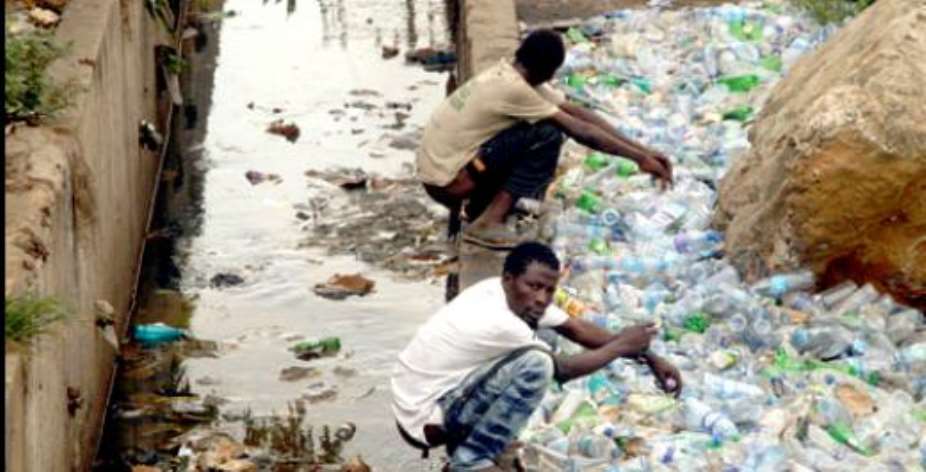A nursing mother had arrived at Aflao. That was years ago. She dropped her hand bag on the floor, raised her head up towards the carrier on top of the bus to identify and collect her luggage.
She was ready to go, cross the border to Lome, into Togo, but realized a parcel in her hand bag was missing.
The nursing mother looked left and right and moved.
She crossed the border and at the taxi rank identified the parcel. It had been dropped there. The content was shit, apparently mistaken for a valuable by a hoodlum.
This one happened in Accra, at a major suburb. A long queue at a public toilet was moving too slowly for a client. Let us call him, “The man”.
The Man was behind three others and many, many more were behind him. All the six cubicles were occupied.
The Man could stand it no longer and pushed past the two in front of him.
He then moved from cubicle to cubicle and found in the fourth, a quite aged client struggling to discharge.
The Man pulled him away, squatted and released three quick gust of the “load.”
The Man then helped the other client back on to the pot saying “you were wasting time, you see how to do it”.
The two narrations, which were not fiction, illustrates the problem of open defecation on two fronts.
Packaging and how the problem affects the aged.
People might not go out of their homes and offices to defecate in the open; at the beaches and in bushes.
They will do it in the seclusion of their homes and package it for disposal.
Packaging styles and materials are varied. The common one is polythene, normally black.
Any black polythene bag hardly moving at direction of the wind could have feces inside it.
Any rag similarly not moving at the direction of the wind, most probably holds shit.
Even used food packaging items, in the local parlance called takeaway, could hold toilet.
These observations were made walking through not so much secluded areas in Ho, the Volta Regional capital.
I conclude therefore that the very secluded areas, could have worse manifestation of open defecation.
In many homes without toilets, stools of children are perhaps not considered as harmful.
They are swept as any other garbage and dumped in the garbage bin. Some are mixed with ashes or sand and disposed of around the vicinity of homes.
Every morning, some of the liquid waste thrown into drains and other places are mixed with shit.
Drains into which bath water collects is also a receptacle of feces in some homes.
The situation is so serious and can only be tackled with multifaceted methods.
Policies must tackle the fundamentals, in the short, medium and long term.
Population of Ghana appears galloping.
The youth component of the population is very high and they would be procreating to overrun services, health, sanitation, education, security among others.
The situation where more than half of families in Ghana live in single rooms, usually in compound houses, many without toilets, makes the problems a hydra-headed.
How do the aged cope with the reality of no toilets in many homes? I do not see them joining queues but the also do it and where.
Open defecation is intertwined with Ghana’s development.
In the shadow of economic projections by government is the sinewy issue of open defecation whose resolution I believe moves in tandem with economic fortunes of the country.





 There’s nothing you can do for us; just give us electricity to save our collapsi...
There’s nothing you can do for us; just give us electricity to save our collapsi...
 Ghanaian media failing in watchdog duties — Sulemana Braimah
Ghanaian media failing in watchdog duties — Sulemana Braimah
 On any scale, Mahama can't match Bawumia — NPP Youth Organiser
On any scale, Mahama can't match Bawumia — NPP Youth Organiser
 Never tag me as an NPP pastor; I'm 'pained' the 'Akyem Mafia' are still in charg...
Never tag me as an NPP pastor; I'm 'pained' the 'Akyem Mafia' are still in charg...
 Your refusal to dedicate a project to Atta Mills means you never loved him — Kok...
Your refusal to dedicate a project to Atta Mills means you never loved him — Kok...
 2024 elections: I'm competent, not just a dreamer; vote for me — Alan
2024 elections: I'm competent, not just a dreamer; vote for me — Alan
 2024 elections: Forget NPP, NDC; I've the Holy Spirit backing me and nothing wil...
2024 elections: Forget NPP, NDC; I've the Holy Spirit backing me and nothing wil...
 2024 elections: We've no trust in judiciary; we'll ensure ballots are well secur...
2024 elections: We've no trust in judiciary; we'll ensure ballots are well secur...
 Performance tracker: Fire MCEs, DCEs who document Mahama's projects; they're not...
Performance tracker: Fire MCEs, DCEs who document Mahama's projects; they're not...
 Train crash: Railway ministry shares footage of incident
Train crash: Railway ministry shares footage of incident
